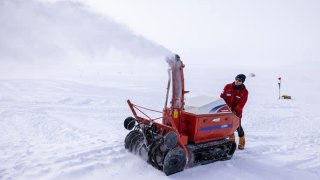
- The Arctic is becoming wetter and stormier as global climate change puts its vulnerable ecosystems and local communities at risk, scientists said Tuesday in an annual assessment of the Arctic.
- The researchers described how hotter air temperatures, melting sea ice, shorter periods of snow cover, increased wildfire and rising levels of precipitation have forced wildlife and Indigenous people in the region to adapt.
- Scientists warned that maritime ship traffic is on the rise in the Arctic as sea ice declines, with the most notable increases in traffic occurring among ships traveling from the Pacific Ocean through the Bering Strait and Beaufort Sea.
The Arctic is becoming wetter and stormier as global climate change puts its vulnerable ecosystems and local communities at risk, scientists said Tuesday in an annual assessment of the region.
The researchers described how hotter air temperatures, melting sea ice, shorter periods of snow cover, increased wildfire and rising levels of precipitation have forced wildlife and Indigenous people in the region to adapt.
2022 was the Arctic's sixth warmest year on record, continuing a decades-long trend in which Arctic air temperatures have warmed faster than the global average, the report said. The Arctic's seven warmest years since 1900 have been the last seven years, and researchers pointed to a slew of signs that the region is undergoing a dramatic shift.
Get Boston local news, weather forecasts, lifestyle and entertainment stories to your inbox. Sign up for NBC Boston’s newsletters.
For instance, a heat wave in Greenland in September prompted severe ice melt for the first time in more than 40 years, the report said. Climate change has triggered longer summers in Greenland and accelerated the retreat of glaciers.
Scientists also noted that maritime ship traffic is on the rise in the Arctic as sea ice declines, with the most notable increases in traffic occurring among ships traveling from the Pacific Ocean through the Bering Strait and Beaufort Sea.
Money Report
The rise in ship traffic opens economic opportunities for new trade routes, but also poses potential damage to the ecosystem and Arctic communities. Scientists have predicted that 2035 Arctic sea lanes might be ice-free in the summertime.
Nearly 150 Arctic scientists from 11 countries developed this year's Arctic Report Card. The assessment "underscores the urgency to confront the climate crisis by reducing greenhouse gasses and taking steps to be more resilient," National Oceanic and Atmospheric Administration administrator Rick Spinrad said in a statement.
Scientists warned that Arctic precipitation is on the rise across all seasons and these seasons are shifting. The changes have disrupted the lives on people, animals and plants that have previously experienced traditionally cold and dry conditions.
The Arctic is warming nearly four times faster than the rest of the Earth, researchers discovered this year, a phenomenon that is raising sea levels across the world. A one-foot rise in global sea levels would have major consequences for coastal communities, as sea level rise threatens to displace almost 200 million people by the end of the century.






